Did you know that 50% of all the cells on and inside your body are non-human? Our bodies are host to approximately 40 trillion microorganisms, including bacteria, archaea, viruses, yeasts, fungi, protozoa and parasites — all of which can influence human health and disease.
For example, our intestinal microflora has a significant impact on how well our immune system works.
Why Your Gut Bacteria Health Is Important
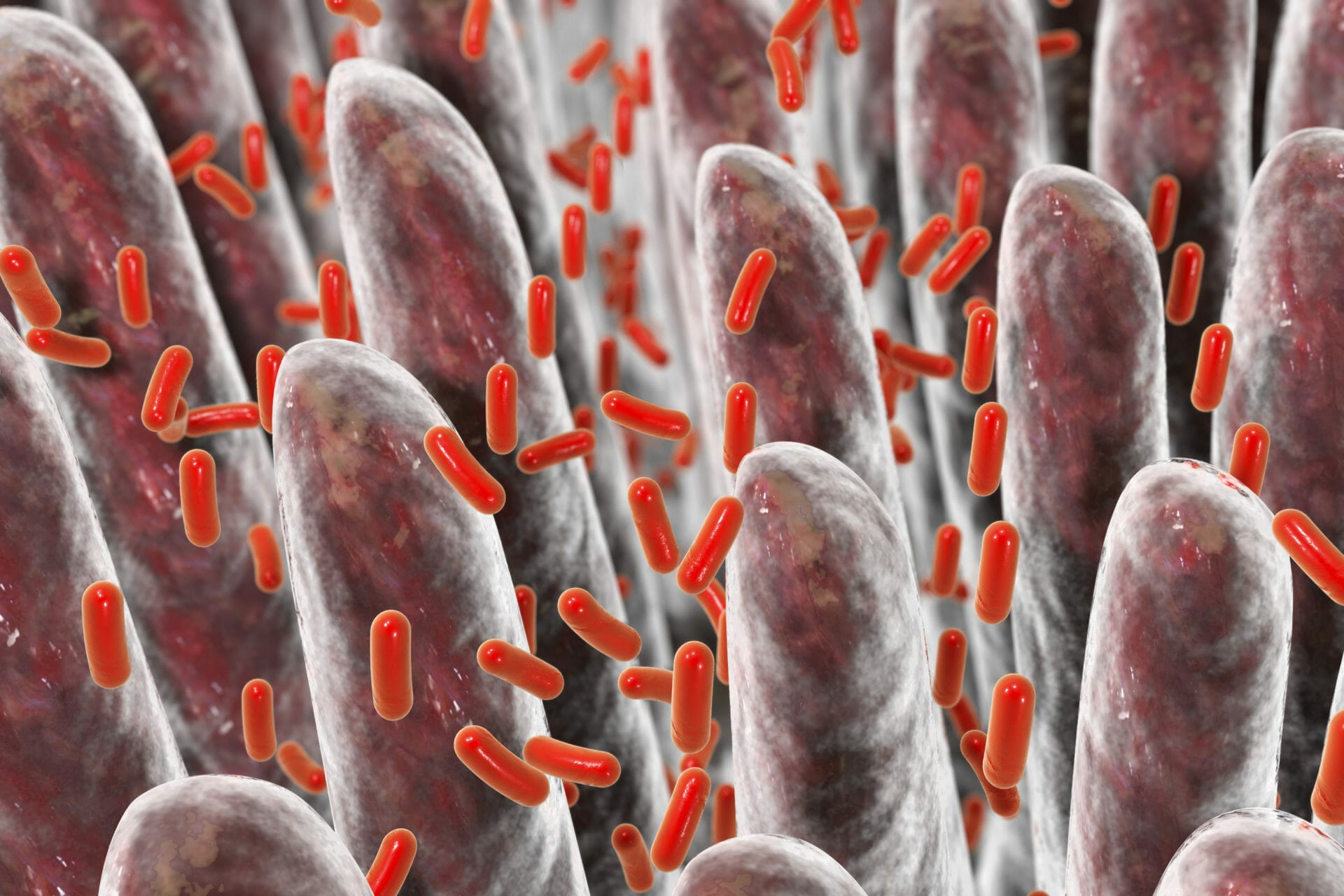
You probably already know that your gut is home to trillions of bacteria that help break down the food you consume, producing essential vitamins and enzymes in the process. You might also know that the food you eat (or don’t eat) can positively or negatively influence the makeup of your gut microbiota.
For example, if you consume a diet that’s rich in starches and other carbohydrates but low in fat, you’ll likely end up with a larger population of bacteria that thrives on carbs and a lower population of bacteria that needs fat for fuel.
As a result, your diet is often a major contributing factor to what’s called a dysbiosis (an unbalanced gut microbiome), which can lead to health problems such as bloating, small intestine bacterial overgrowth (SIBO), irritable bowel syndrome (IBS), reduced immune function and other digestive health issues.
However, it’s worth noting that a bad diet isn’t the only factor at play here. Other factors include stress, poor sleep, lack of exercise, excessive alcohol consumption, antibiotic treatments and a variety of other lifestyle variables.
That’s why many people use probiotic supplements in an attempt to “fix” their gut health by introducing probiotic strains into their digestive tract. The assumption is that adding “good bacteria” via supplements replaces some of the bad or opportunistic bacteria.
Unfortunately, as we’ll discuss in this article, restoring a healthy microbiome is not always as simple as popping a pill.
What Are Probiotics?
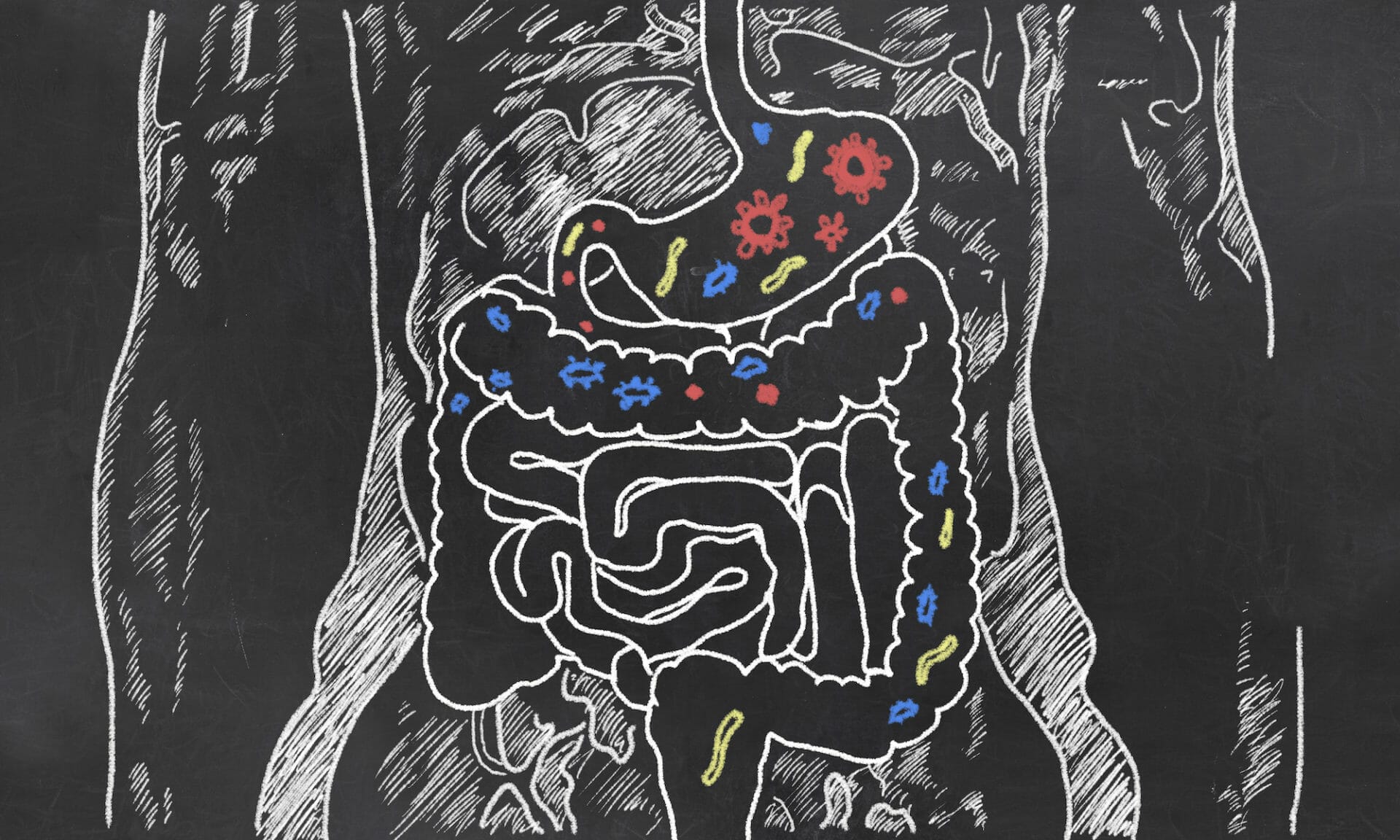
Probiotics are live microorganisms (usually bacteria) that some people consume as supplements because of their purported health benefits. Certain probiotics also naturally occur in food, especially in fermented products like yogurt, kefir, kombucha, kimchi and sauerkraut.
What Are Soil-Based Organisms?
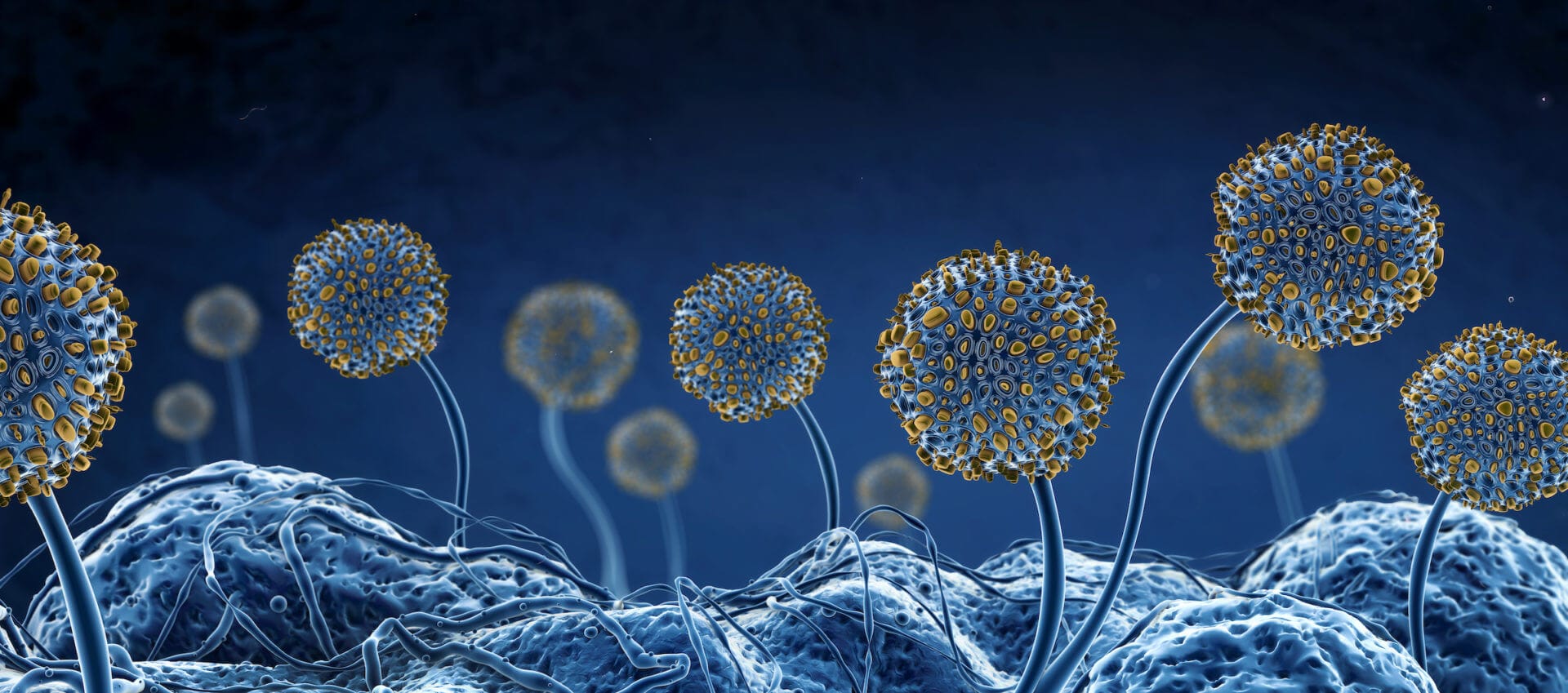
Soil-based organisms (SBOS) are, as their name implies, microorganisms that naturally occur in soil. In nature, SBOs enrich the soil and protect the beneficial bacteria that plants use to grow.
Soil-based probiotics are spore-forming, which is why some people also refer to them as spore-based organisms. The reason why sporulation (one of the three stages of the bacterial life cycle of SBOs) is important is that the spore structure protects the dormant bacteria from environmental factors, such as soil acidity.
That natural protection mechanism makes SBOs ideal for human consumption because it ensures that the bacteria can make it through the harsh environment that is the human GI tract by withstanding stomach acid and other substances that can destroy or degrade traditional probiotics.
Humans have consumed soil-based organisms via food for millions of years and there is no scientific evidence that our Paleolithic ancestors triple-washed their wild lettuce. If modern-day primates are any indication, they might have just cleaned food using their hands (much like Gorillas do).
As a result, they also consumed the microorganisms that lived in that soil, including bacteria, yeast and fungi.
Of course, I’m not suggesting that you shouldn’t wash the produce you buy at the grocery store. After all, you don’t know where it came from or how many people have touched it before you.
But in the Kummer household, we don’t wash any of the produce that comes from our own organic veggie garden. We don’t feel the need to because we don’t use any chemicals — not even the ones labeled for organic farming. While doing so might expose us to other environmental toxins, we feel like it’s worth the risk.
Probiotics vs. Prebiotics
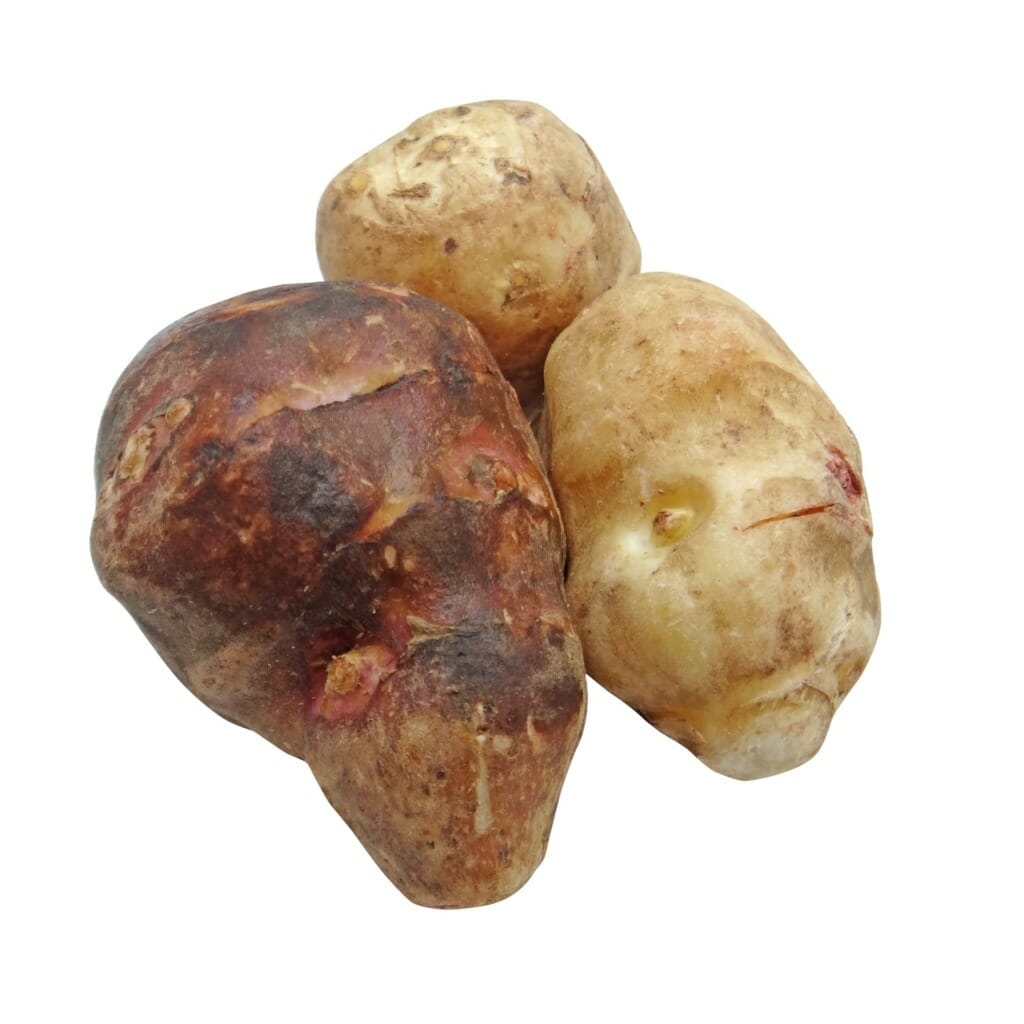
If you’ve been looking into probiotics, you’ve probably also come across the term “prebiotics.” And you might be wondering about the difference.
In a nutshell, the term probiotics refers to live microorganisms, such as bacteria, that provide a health benefit if administered in adequate amounts.
The term prebiotics refers to food (metabolic fuel), such as fiber and other complex carbohydrates, that support probiotics.
In other words, by consuming foods or supplements that are rich in prebiotics, you can support the bacteria that live in your gut.
Soil-Based vs. Traditional Probiotics

Traditional probiotic supplements usually consist of strains of one or more of the following types:
- Bacillus
- Bifidobacterium
- Enterococcus
- Escherichia
- Lactobacillus
- Saccharomyces
- Streptococcus
While there is sufficient scientific evidence that traditional probiotics are a safe and effective treatment option for reducing antibiotic-associated diarrhea, allergies and symptoms of IBS (as well as several other conditions), they have some downsides you should be aware of.
One of the main issues with traditional probiotics is that they have a limited shelf life. In other words, many probiotic supplements start deteriorating after they’ve been manufactured, resulting in a reduced number of viable, live organisms at the time of purchase.
That’s why it’s important to look for products that have a colony-forming unit (CFU) count that’s guaranteed at the end of the product’s shelf life, not at the time it was manufactured.
The second problem with traditional probiotics is that they can get damaged or destroyed by stomach acid, further reducing the number of live organisms that make it into the lower gastrointestinal (GI) tract, where they are most effective.
One misconception with traditional probiotics is that they colonize the gut. That’s not the case! Instead, most are transient and are only effective for shorts periods. While that doesn’t limit their effectiveness for conditions such as those mentioned above, it’s worth noting that a single regimen of probiotic supplements won’t permanently change your gut microbiota.
So what about soil-based probiotics?
SBOs have several advantages over their traditional counterparts. Most importantly, SBOs are typically shelf-stable and have natural mechanisms to protect the bacterial strains from the harsh environment of the stomach. As a result, SBOs don’t require any preservatives or synthetic coatings (like traditional probiotics do).
That’s because the spore structure of SBOs preserves the bacteria until it reaches the lower intestine, where it becomes active.
The downside of some soil-based organisms is that they can colonize the gut. While that sounds like an advantage, it can impact the proliferation of both good and bad native bacteria.
That’s why it’s important to choose products that have transient SBOs that don’t stay in your gut permanently. The spore-based supplements I’ll introduce you to further down include such transient strains that get flushed out of your system approximately 30 days after consumption.
Health Benefits of Soil-Based Probiotics

While soil-based probiotics aren’t native residents of the human GI tract, they have been part of the human diet for millions of years. Consequently, they have been an important piece in the microbiotic puzzle.
One of the important roles that SBOs play is to create a more hospitable environment for good bacteria to thrive. They accomplish that by reducing oxidative stress in the gut and by stimulating intestinal autophagy.
If you’ve read my article about intermittent fasting, you might remember that autophagy is a crucial cell renewal mechanism that can prevent or slow down diseases.
In other words, SBOs help to condition the intestinal environment so that your natural, diverse flora has the best chance to proliferate.
Besides reducing oxidative stress, SBOs also produce highly bioavailable nutrients and reinforce the gut lining by making the “tight junctions” tighter. A leaky gut lining (also known as intestinal permeability) allows toxins and inflammatory chemicals to get directly into your bloodstream, where they wreak havoc.
Should You Consider Using Probiotic Supplements?
As I mentioned in my August newsletter, I’ve come to the conclusion that evolution has made the human body perfectly suited for an environment that doesn’t exist anymore.
As a result, we have to jump through hoops to mimic some of the traits and behaviors of our ancestors by eating a paleo or ketogenic diet, going to the gym, fasting intermittently (despite having a full fridge) or wearing blue-light-blocking glasses to reduce our exposure to certain light frequencies that don’t exist in nature (after sunset).
We do these things because some of us have realized that the human body doesn’t do well when consistently fed a “regular” diet, being forced into sedentary behavior, and so on.
Another one of the practices that we’ve abandoned over the last century is staying in close contact with the soil and eating the products we grow in it without sanitizing or triple-washing them. As a result, most of us aren’t exposed to soil-based bacteria and other microorganisms.
While I encourage you to reconnect with the soil in your backyard by running around barefoot or avoiding sterilizing the produce of your own veggie garden, I realize that most people live in an environment where that’s not possible.
Soil-based probiotic supplements can help fill some of those gaps, and that’s why I highly recommend them. Much like beef liver capsules, SBOs can fill dietary gaps that you can’t easily bridge with simple lifestyle changes.
At the Kummer household, we’ve been using a high-quality SBO supplement on and off for over a year and we’ll continue doing so.
Recommended Soil-Based Probiotics
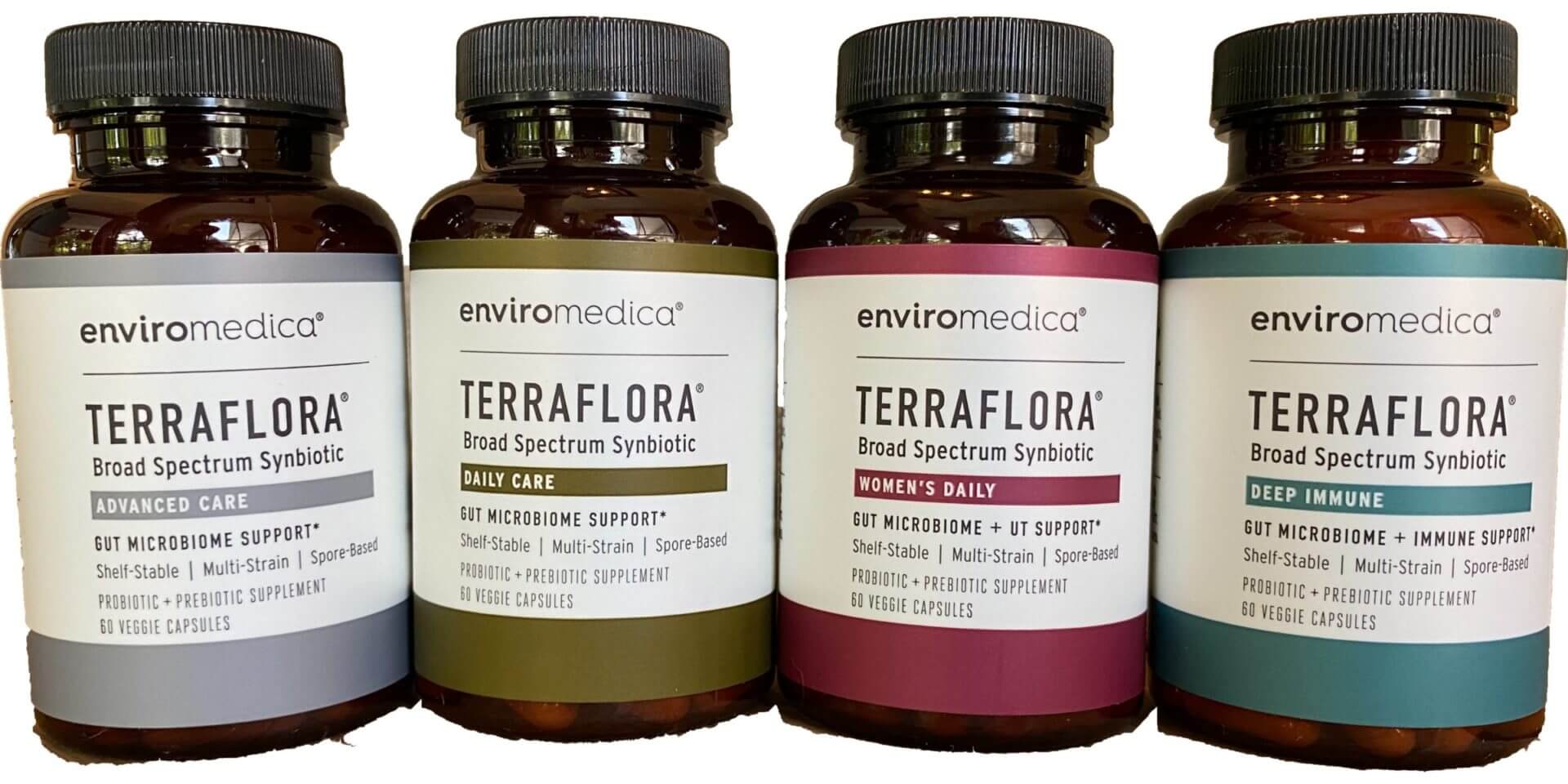
Below is a list of soil-based probiotics that we use at the Kummer household and that I’ve recommended to friends and family.
These are made by Enviromedica, the brand you might remember from my article about the benefits of beef liver.
As of this writing, Enviromedica offers four distinct SBO supplements under its Terraflora branding, including:
- Daily Care
- Deep Immune
- Advanced Care
- Women’s Daily
All four supplements contain spore-based probiotics and prebiotics, a combination Enviromedica calls “synbiotic.”
The strains included in those supplements are recognized by the FDA as generally safe (GRAS) and have achieved a QPS certification (a label from the European Food Safety Authority).
Enviromedica also fully genome-sequenced each strain to confirm that they are not pathogenic. That’s important because there are also pathogenic microorganisms in soil that can be detrimental to your health.
You can use discount code HEALTHTECH to get 10% off your purchase.
Terraflora Daily Care
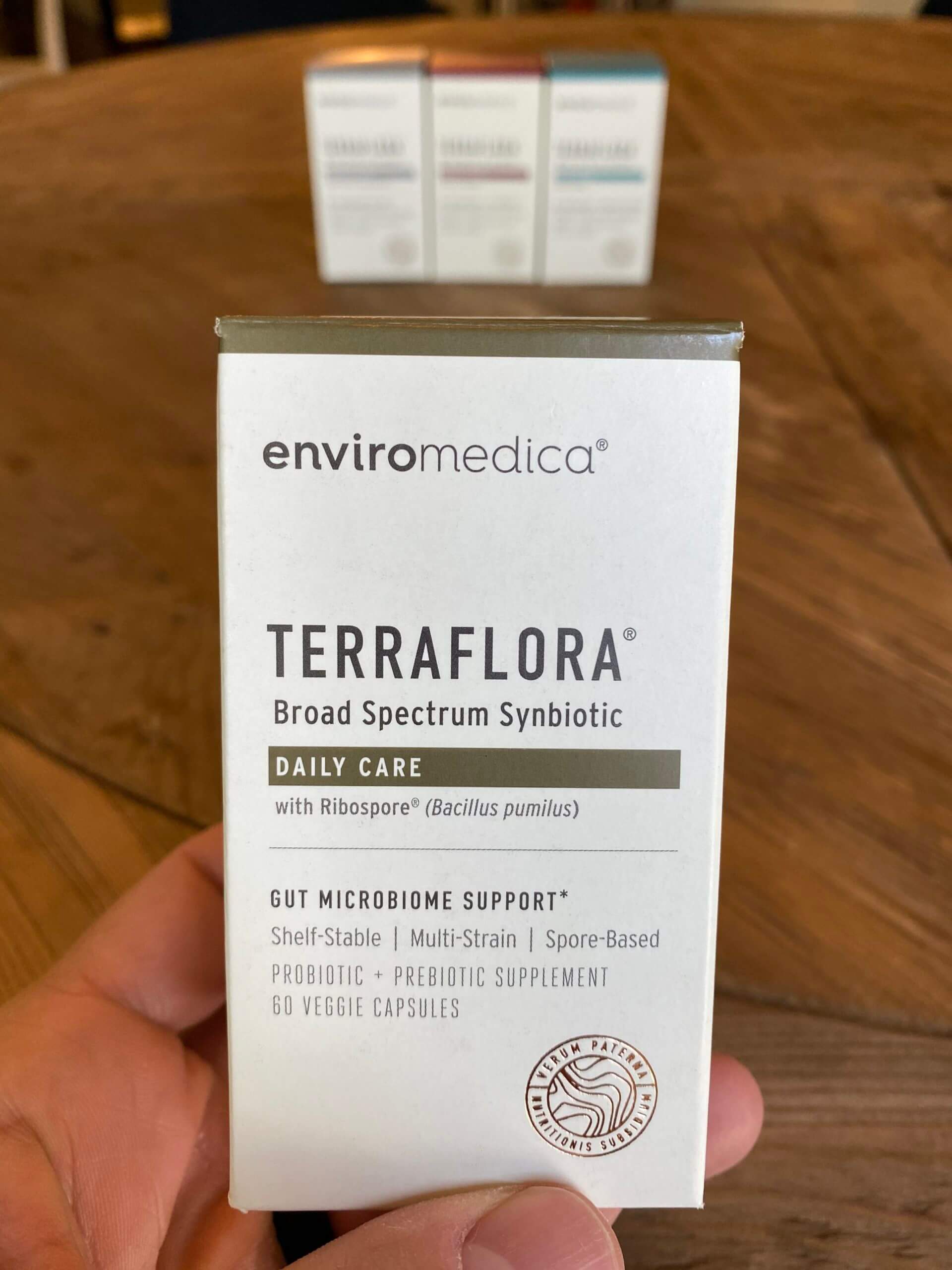
Daily Care is a broad-spectrum synbiotic complex (a combination of prebiotics and probiotics) that contains one billion viable cells per serving.
Traditional probiotics often contain significantly higher CFU counts (up to 75 billion). But remember, only a subset of viable cells make it into the lower GI tract.
The term synbiotic refers to a combination of probiotics and prebiotics, consisting of the following strains:
- Ribospore (bacillus pumilus)
- Bacillus megaterium EM144
- Bacillus subtilis
- Bacillus clausii
- Bacillus coagulans
Additionally, the bio-complex contains 850 milligrams per serving of the following prebiotics (food for the bacteria):
- Humic acids
- Larch arabinogalactan
- Reishi extract
- Wild-harvested chaga extract
- Wild-harvested Nova Scotian bladderwrack extract
- Wild-Harvested Patagonian Wakame Extract
Most of these prebiotics are complex carbohydrates (i.e., fiber) from plant-based sources.
Terraflora Deep Immune
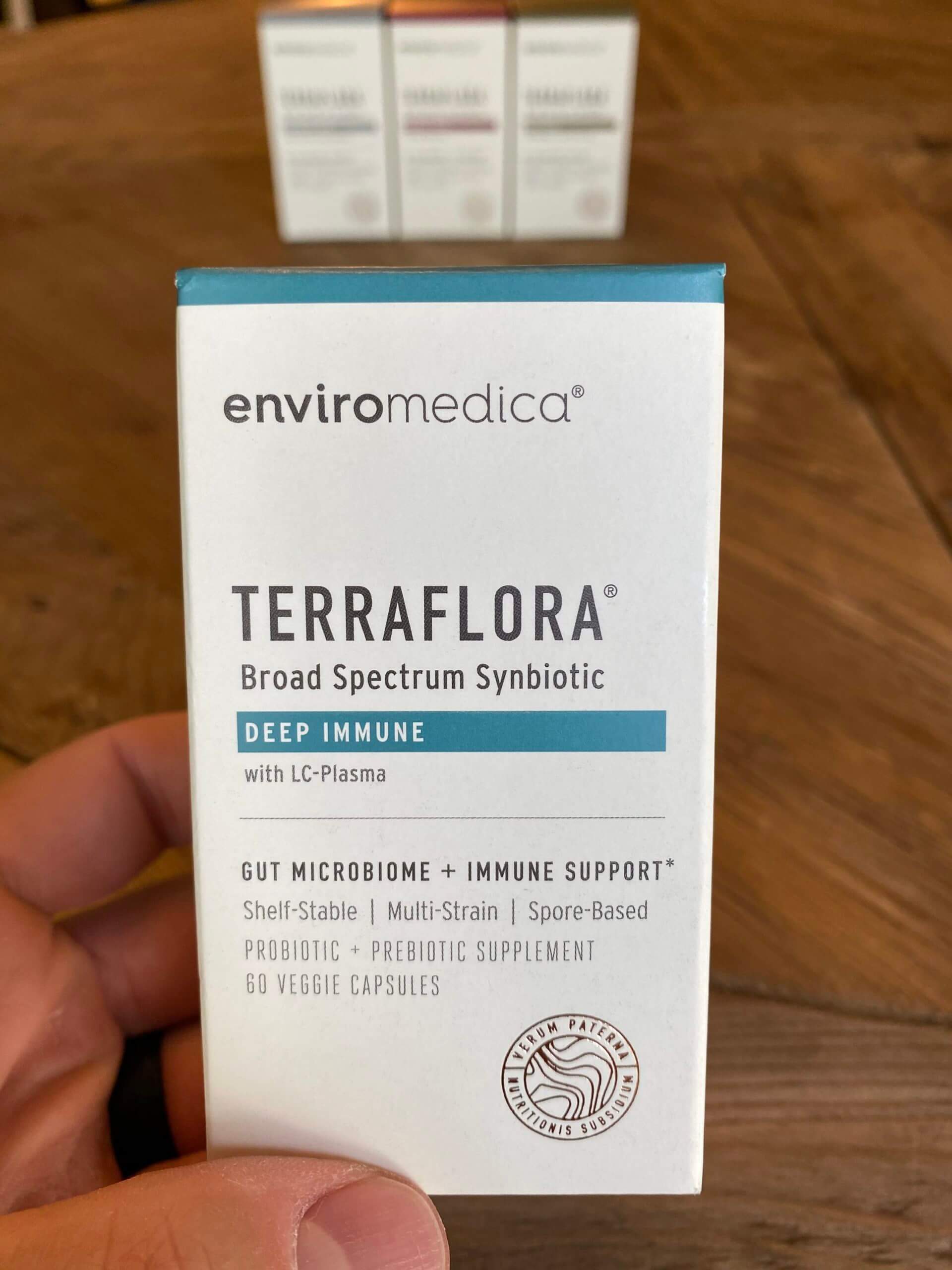
Deep Immune has all of the same bacteria strains as Daily Care, but it also contains lactococcus lactis strain plasma (LC-plasma), which studies have shown to prolong life in mice, improve recovery, reduce cold-like symptoms, activate immune cells and more.
Terraflora Advanced Care
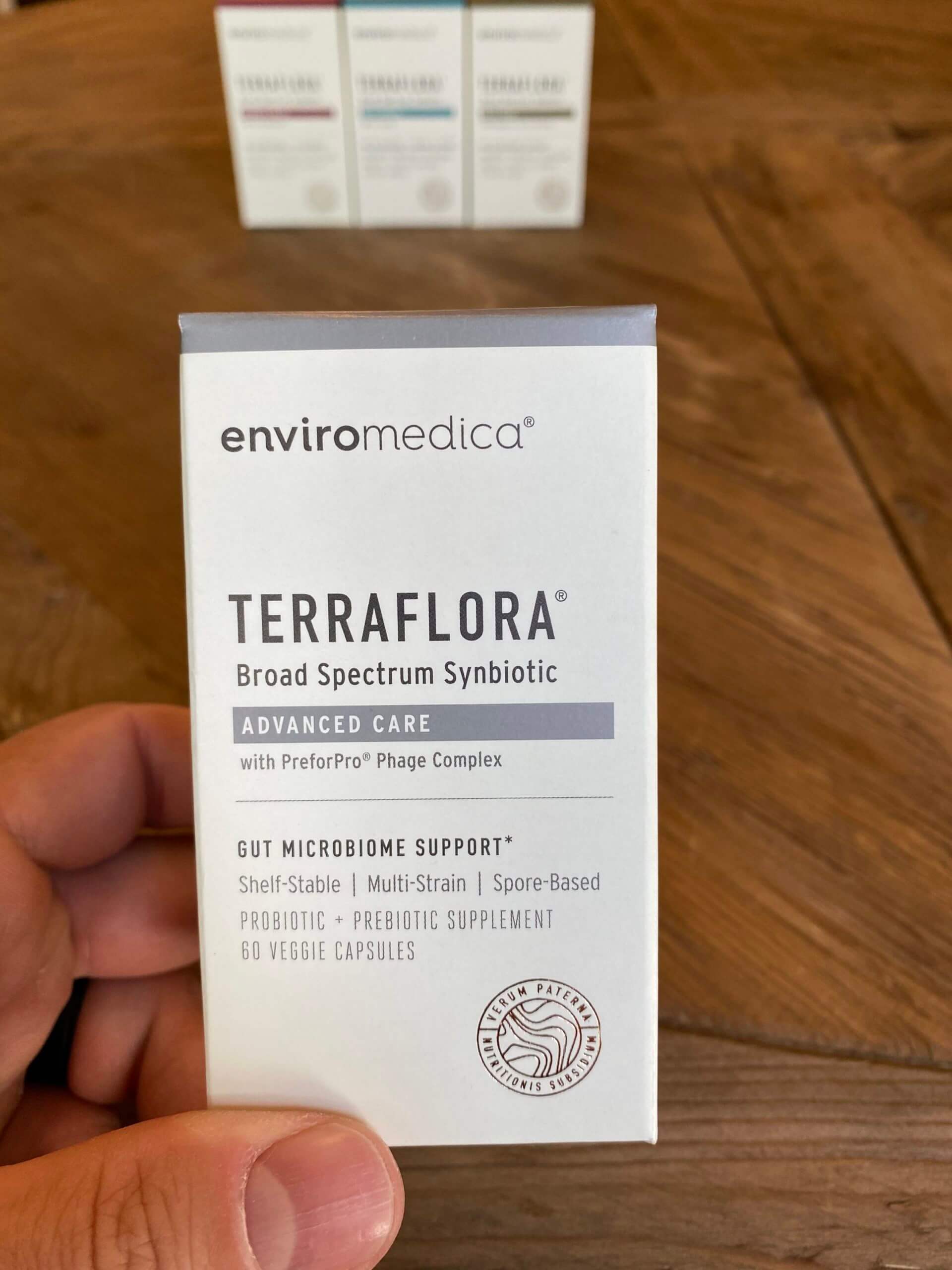
Advanced Care includes targeted bacteriophages, a type of virus that infects and suppresses harmful bacteria, thus allowing the good bacteria to thrive and proliferate.
Bacteriophages also increase the counts of butyrate, an acid that tightens the intestinal junctions in the gut lining.
As a result, Advanced Care can help balance the intestinal microbiome, especially if you suffer from a dysbiosis or an overgrowth of harmful bacteria.
Frequently Asked Questions
You can get an upset stomach. That’s why Environmedica recommends starting with one capsule every other day before slowly increasing your intake of SBOs. Any discomfort you might experience is usually temporary and goes away after a few days.
SBOs are heat resistant, shelf-stable and arrive intact in the lower GI tract because of their inherent resilience to harsh environments. Traditional probiotics often require refrigeration and don’t make it through the upper GI tract in large enough numbers.
The best natural source of SBOs is your local soil. So if you have your own organic vegetable garden, I encourage you to consume your produce without extensively washing it.
Alternatively, you can try to find fermented foods that were made using veggies from your area. We used to buy fermented cabbage (sauerkraut) from a guy at the Alpharetta farmer’s market who buys the ingredients he uses from local farmers. As a result, the final product contains local soil bacteria that you won’t get when you buy products that were made with sterilized ingredients from other parts of the country.
SBO Probiotics – Wrap-Up
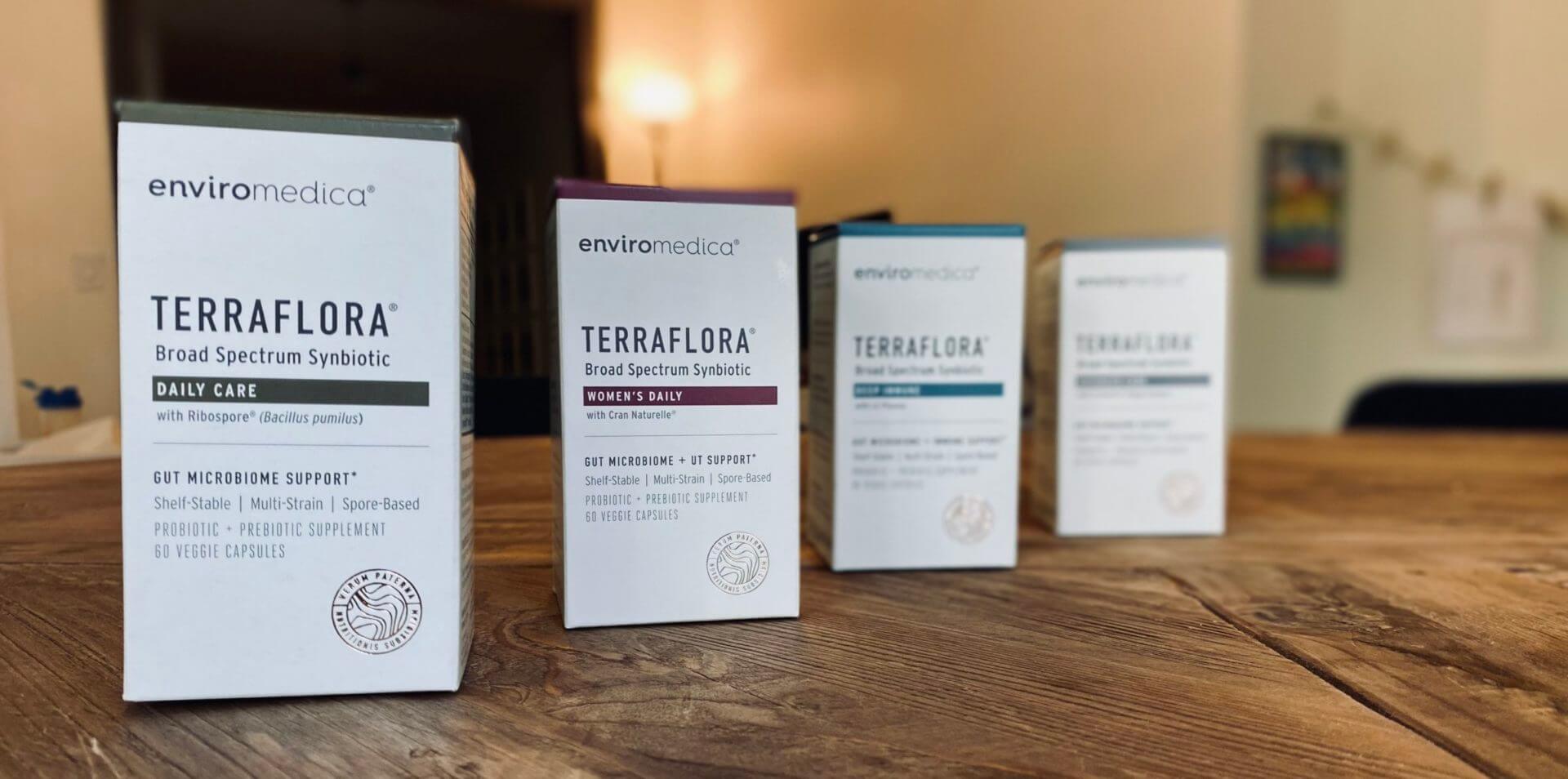
A healthy gut is key for your overall health and well-being. That’s why it’s vital that you do everything you can to support the good bacteria in your gut while keeping the bad bacteria at bay.
Besides taking care of your sleep needs, eating a healthy diet, exercising regularly and managing stress well, I also encourage you to consider soil-based probiotics.
Humans, and the human gut in particular, had been exposed to soil bacteria for millennia. But our modern lifestyle, unsustainable farming practices, and the real risk of contracting listeria, E.coli, salmonella or other infectious diseases from contaminated, commercially-grown veggies have all contributed to virtually eliminating our exposure to these beneficial microorganisms.
That’s why I recommend supplementing with probiotic bacteria from soil-based sources, in addition to making all the right lifestyle choices that I’ve been promoting on this blog, including a proper diet, exercise and sleep.

Michael Kummer is a healthy living enthusiast and CrossFit athlete whose goal is to help people achieve optimal health by bridging the gap between ancestral living and the demands of modern society.
Medical Disclaimer
The information shared on this blog is for educational purposes only, is not a substitute for the advice of medical doctors or registered dieticians (which we are not) and should not be used to prevent, diagnose, or treat any condition. Consult with a physician before starting a fitness regimen, adding supplements to your diet, or making other changes that may affect your medications, treatment plan or overall health. MichaelKummer.com and its owner MK Media Group, LLC are not liable for how you use and implement the information shared here, which is based on the opinions of the authors formed after engaging in personal use and research. We recommend products, services, or programs and are sometimes compensated for doing so as affiliates. Please read our Terms and Conditions for further information, including our privacy policy.
Great article, I personally eat SDO (Soil derived Organic matter) which is fermented for 10 years at a Bio Dynamic Farm owned by a friend – with amazing results.